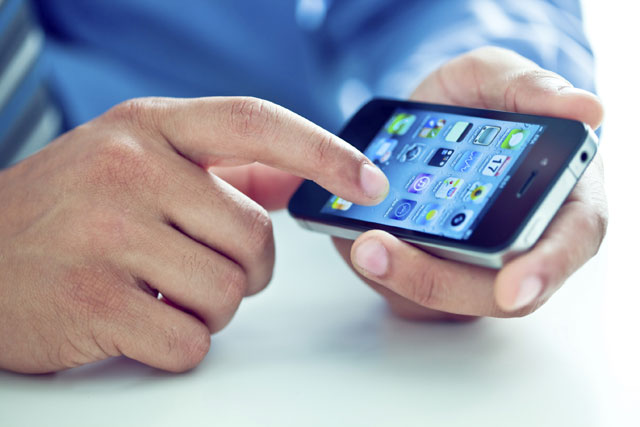Step off the plane and there is a check-in and registration area set aside within the airport specifically to cater for the global audiences flying in to get a look at the future for the mobile industry.
But then the day itself is something else. Eight huge halls filled to the brim with a Techies wet dream of new kit, amazing future developments and people.
Lots and lots of people. The exhibitors are showing off their shiny new toys - this year's big themes are around smaller, lighter more powerful Smartphones and Tablets, Smartphones for emerging markets at just $35, wearable technology and the 'internet of things'.
Anything you can imagine that *could* be powered or controlled by a mobile is here. From obvious benefits like mobile payments and loyalty schemes to the more niche such as home security, mobile door locks, monitoring personal health, to reporting back on your performance on the basketball court via wearable tech vests.
And while the shiny toys are being shown off on amazing stands, so the conference halls are full of senior figures debating the future for the world of mobile and mobile tech.
Zuck steals the show
The star speaker on day 1 was clearly one Mr Mark Zuckerberg. The obvious early commentary was about the WhatsApp purchase.
Mark commented that WhatsApp was worth $19bn in reach alone as a standalone app, even though it can't match that in revenue - yet. "I could be wrong but don't think so" was his modest assumption.
But when you put it together with Facebook strategically, it makes total sense. FB wants to be there to help them hit one billion people, many of whom are new to the Facebook family. And all of them, of course, are on mobile.
He summed it up by saying that "The reality is there a very few services that reach a billion people in the world. They’re all much more valuable."
He then moved quickly away from WhatsApp conversation and bringing it back to a conversation around his quest to bring free internet to the developing world.
The project would provide access to people not currently online, driven by mobile, with cheaper handsets and data plans. Facebook would (of course) come already loaded and that would be the start.
Connecting the world
For the plan to work, it would require a data delivery system at a low cost through operator partnerships. He said that the main barrier to internet access being spread further is mainly around money but also access.
It is a major project and he constantly made mention of the fact that it would not make money in the short term. It all comes back to a vision he has of "connecting the world".
Whether the young billionaire is indeed driven by money, goodwill, connectivity, or a combination of all, remains to be seen but what is not in doubt is his clear passion for the mission of connecting and his appetite to keep expanding the Facebook family.
When asked if he was still pursuing Snapchat, he said a stern "no". But couldn't resist following on with a cheeky "when a business drops $16 billion on an acquisition, that's probably enough for the time being". With Facebook though you just don't know.
Earlier in the day his new partner and founder of WhatsApp, Jan Koum, was on stage talking about "disruption" and announced the launch of WhatsApps voice calling service to launch in Q2 this year.
This is big news and a view as to why Mr Z paid what he paid for the growing start up. He coolly announced the small matter of the Facebook deal by opening his keynote with "so we signed a new Facebook friend this week, did you hear?"
We're not getting enough out of mobile yet
The rest of the day had a wide variety of speakers all of whom seemed to have a key theme - we're not getting enough out of mobile just now.
Melanie Scott, the commercial director of the MailOnline, had some insightful views as to her challenges running the revenue side of the world's 6th biggest news website, delivering a huge 55 million monthly global users.
Mail Online traffic is now 35% smartphone, with the highest increase in audiences driven by mobile +118% year on year.
Her challenge, as with so many publishers, is to monetise mobile according to time spent, with Melanie's mobile and tablet audience accounting 54% of time spent - "people stay online for longer when they are untethered"
Inevitably, data and "big data" were central to a lot of conversations. Certainly data use is rocketing with video content expected to eat up 50% of data in two years time.
Again monetizing and physically providing this data requirement are the key challenges here.
Closer to home, Weve's chief executive, David Sear, spoke on a panel of the importance of using data properly, "Big data is not useful, it is just big, its merit is in the insight it brings" and the other panellists agreed.
With a plethora of businesses offering "unique" insight or data which is basically a behavioural algorithm, it probably explains why so much mobile advertising is planned with a desktop mentality.
This absolutely has to change if we in the UK are to see money migrate from desktop to mobile in the same way that traffic has migrated, and is totally key to Weve's first party data offering on Display which will shake up the marketplace when we get out of our trial phase in May.
Overall a great first day. So much more to come.
Nigel Clarkson is commercial director of Weve


